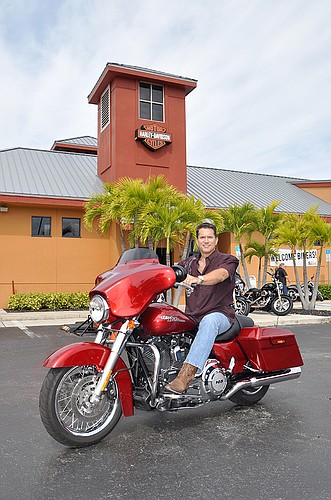- November 25, 2024
-
-
Loading

Loading

People love their Harleys.
Just ask Peter Wasmer, the CEO of Chrome Capital, a Naples-based company that leases previously owned Harley-Davidson motorcycles.
Of the 1,100 pre-owned Harleys his company has leased to riders, only seven of them have been late with their payments by 90 days or longer. “We have never lost a bike,” says Wasmer, chuckling at the thought of jinxing that streak.
Chrome's success has attracted the attention of a multibillion-dollar conglomerate called Leucadia National Corp., which recently took a majority equity stake in the business with a $20 million investment. That investment could grow to $86 million to fund the company's future growth.
After just two years in business, Chrome's revenues totaled $3 million last year. Wasmer says revenues could jump to $15 million this year. Already, Chrome has signed up 300 Harley-Davidson dealerships, nearly half of the total in the U.S. “We bleed orange and black,” says Wasmer.
Wasmer, who has prior experience in the equipment leasing business, says he discovered he could make a business out of a passion for Harley-Davidson motorcycles. “What we found was a good asset and the right business cycle for the riders and the dealers,” he says. (He is not related to Martin Wasmer, CEO of Naples-based bond-management firm Wasmer, Schroeder.)
While Harley-Davidson's own finance company will lend to people to buy pre-owned motorcycles from dealers, Chrome leases them to people with lower credit scores. Typically, lower-credit customers might put 20% down on a pre-owned Harley, make the first month's payment and pay a security deposit. Then, their monthly payments are deducted straight from their checking accounts, much like a scheduled utility payment.
Surprisingly, even lower-credit Harley customers are rarely late on their lease payments because the motorcycle is an integral part of their image and lifestyle. “That's not a motorcycle,” Wasmer says. “It's something totally different. They don't want to lose their bikes.”
Customer demographics range widely from doctors to plumbers, lawyers, women and minorities. Wasmer says he only was surprised by the fact that he thought he would have more customers new to motorcycle riding.
Dealers welcome Chrome because the firm helps them sell more motorcycles and all the accessories they can add. “They spend thousands [in marketing] getting these guys in the door,” Wasmer says, noting Chrome pays the dealership a fee for arranging a lease between $150 to $225 per bike.
The process is simple once a customer decides to lease a bike: “[Dealers] sell the bike to us,” Wasmer says. At the end of the lease term, usually about three years, the customer can buy the Harley or renew the lease. If the customer declines to buy it or renew the lease, the dealer can buy it or Chrome will sell it wholesale. Harleys follow a predictable path in value, down the first three years and stabilizing afterwards. Chrome has estimated residual values on Harleys going back a decade, Wasmer says.
Plus, Chrome designed the lease-application system to be automated from a desktop computer, making it easy for the dealer to make the deal. “It's built for this business,” Wasmer explains. “It's expandable and scalable to infinity.”
While Chrome is used by 300 dealerships today, there are more than 650 Harley-Davidson dealerships in the U.S. Thanks to Leucadia's investment, Wasmer says he expects to have 3,000 leases completed this year and 7,500 in 2015. “Our natural resource is money,” Wasmer says.
Chrome won't sell the leases, but Wasmer says the company plans to start securitizing them and selling the bonds in 2015. “Everybody's in it for the long haul,” Wasmer says.
Follow Jean Gruss on Twitter @JeanGruss